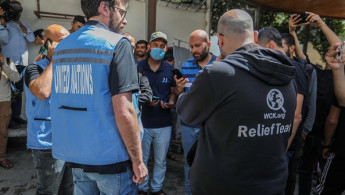Aid workers in Gaza targeted by Israeli military despite sharing location
Aid groups working in Gaza were hit by Israeli strikes even after coordinating with the Israeli army, an investigation by the New York Times (NYT) revealed on Thursday.
The NYT obtained and examined visual evidence and internal communications on six aid group operations that were hit by airstrikes even after their locations were shared with the Israeli military.
The six aid groups are Doctors Without Borders (MSF), Medical Aid for Palestinians (MAP), International Rescue Committee (IRC), Enabel, ANERA, and World Central Kitchen (WCK). They are all in direct communication with the military and are based in Western nations that are known to be Israel's strongest allies.
The investigation notes that despite the Israeli military using a system known as deconfliction, where aid groups share locations with the army to avoid being caught between friendly fire in war-torn areas, incidents still occurred.
NYT highlights the many times aid workers have been attacked despite the system being used. Although World Central Kitchen workers coordinated their location with the army and travelled in a clearly marked vehicle, their envoy was still struck, killing seven aid workers, which Israel had dubbed a mistake.
American aid group ANERA shared emails with the NYT, revealing that the group had repeatedly sent the Israeli military coordinates and photos of their staff shelters.
This included a two-story residential building where aid worker Mousa Shawna and his six-year-old son resided when it was struck by an Israeli airstrike weeks before the WCK incident. The military confirmed that the location was being processed in their system.
Visuals from the aftermath of airstrikes targeting MSF, MAP and IRC compounds show buildings clearly marked and logos visible on the bedding and luggage in the wreckage.
The military claimed they were targeting "terror activity" at the MSF building, which the group has denied.
"Coordinates had been provided to the proper actors for both of these structures that were hit. It is standard for us to provide coordinates to actors involved in conflicts," a spokesperson for MSF told The New Arab.
The publication obtained text messages between MAP and IRC, revealing that a month before the 18 January attack on their residential compound, the Israeli military was informed of the locations and used "high-level diplomatic channels" to deconflict the compound.
The building was also in a neighbourhood that Israel had designated as a humanitarian zone that was safe for civilians.
"The New York Times investigation clearly shows that the Israeli army is responsible for the attacks on aid workers, but still, the Israeli state is not facing any accountability," Aseel Baidoun, Acting Director of Advocacy and Campaigns at MAP, told The New Arab.
Baidoun also noted that the Israeli government offered six conflicting explanations for the attack.
These ranged from being unaware of the attack and denying any involvement to claiming the building was mistargeted due to a defective missile fin. Most recently, Israel stated that the damage was not caused by a bomb but by a piece of aircraft fuselage discharged by the pilot of an Israeli fighter jet.
"The variety of responses highlights a continued lack of transparency regarding what occurred. It is clear from this experience that the Israeli military and government are either unable or unwilling to properly investigate this serious incident," Baidoun adds, calling for a full, independent and timebound investigation into the 18 January attack and all reported attacks on aid workers.
"We need to secure concrete assurances from the Government of Israel that attacks against aid workers and health workers will not occur in the future."
An Israeli airstrike in Deir al-Bala, Gaza has struck a convoy of World Central Kitchen aid workers, resulting in the tragic loss of seven lives - including nationals from Australia, Poland, the UK, a dual US-Canada citizen, and Palestine.
— The New Arab (@The_NewArab) April 2, 2024
The attack drew immediate condemnation… pic.twitter.com/Fk3ZT99Eqs
Over 200 aid workers have been killed since 7 October in Gaza, which is more than three times as many aid workers killed in any single recorded conflict in a single year, according to the United Nations. Many suspended operations following the WCK strike, and MAP and IRC were forced to suspend their work at Nasser Hospital in Khan Younis.
In light of the killing of seven WCK aid workers, aid groups have been blunt, saying there is nothing more they can do to protect staff in the Gaza Strip, asserting that it's up to Israel to avoid killing them. The United Nations has also appealed for direct coordination with the Israeli military.





 Follow the Middle East's top stories in English at The New Arab on Google News
Follow the Middle East's top stories in English at The New Arab on Google News


